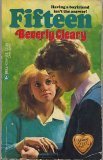“Fifteen” by Beverly Cleary

Beverly Cleary’s Fifteen was a particular favorite of mine when I was young. I re-read it as part of the Summer of Shelf Discovery Readalong for Chapter 8, which is about romance. Re-reading Fifteen, it’s easy to see why I liked it. IT’S SO CHARMING! And yet, not in a saccharine way, at least to me.
(Is my tolerance of its sweetness a result of my nostalgia/early imprinting? One of the things I’ve noticed on this readalong is that some books, e.g., A Wrinkle in Time, aren’t as fiercely beloved by adults who read them for the first time. So I’d be curious if any of you out there read Fifteen for the first time, and what you thought, since my reaction is obviously colored by having a history with it.)
Our heroine, Jane Purdy is fifteen years old. You guessed that, right? The book was published in 1956, and is still in print, so I have to think it’s got something timeless going for it, since modern teens reportedly are obsessed with new things, not relics, and much of it is absolutely of its time:
“Oh, Pop,” said Jane impatiently. “I don’t want to marry him. I merely want to go to the movies with him.”
“Horsemeat!” Mrs. Purdy began to laugh. “He delivers horsemeat!”
Not only was it a time and place in which cajoling your parents into letting a boy take you to a movie was a conflict, but one before dog-food companies stopped advertising their true ingredients.
(Fans of Mad Men might remember in “The Gypsy and the Hobo” how a dog-food company’s brand suffers when the public learns the main ingredient in the early, mid-60’s.)
The attraction of this book for me, and I suspect for others, is that of an every-girl entering into her first romance. Jane and a New Boy meet cute while she’s babysitting a terror of a little girl, and Fifteen, all 125 pages of it, goes back and forth over the age-old question: Does he like me? Jane thinks of herself as plain and boring, especially compared to popular Marcy:
Her yellow cotton dress was too–well, too little girlish with its round collar and full skirt. Her skin wasn’t tan enough and even if it were, she didn’t have a white pique dress to show it off. And her curly brown hair, which had seemed pretty enough in the mirror at home, now seemed childish compared to Marcy’s sleek blond hair, bleached to golden streaks by the sun. (4)
We soon learn that New Boy’s name is Stan Crandall when he calls to ask her out. But Jane is insecure–about how she dresses, her experience, and because she’s never had Chinese food (!), so she frets. And that fretting, about whether he likes her, and how she should be to get him to like her, and whether his liking her is worth pretending to be someone she’s not, is pretty much the conflict and plot of the whole thing. (I don’t think there are many other books out there like this. Yes, there are lots of romances, but they usually have some other conflict, something other than “does he like me” driving the plot.)
As you might guess, Stan likes Jane. I think this is probably obvious to most readers, even if it’s not to Jane. This, alone of the books in Shelf Discovery’s Chapter 8, has a conventional happy ending, one which I found very satisfying, and very cheering. This would be a good book for a bad mood.
And for a recent(ish) equivalent, I found a lot of similarities to Bridget Jones’ Diary. Jane meets Stan in an embarrassing way. Stan likes Jane, even though Jane is embarrassed by her parents. Stan’s roguish friend Buzz flirts with Jane, causing tension between Jane and Stan. Jane does silly, ostentatious things (e.g., giant flower arrangement) and carries them off in amusing and charming ways. At the end, Stan likes her–not Marcy, not the pixie dream girl from his old school–just the way she is.
All that said, though, I wish I could lop off the last two sentences of the book, as I think the one before them finishes things perfectly, and the last two do actually make me squirm:
Smiling to herself, Jane turned and walked toward the house. She was Stan’s girl. That was all that really mattered.
But, like Jane, like all of us, nobody’s perfect, and we all get bogged down in buying into silly visions of romance at one point or another, right?